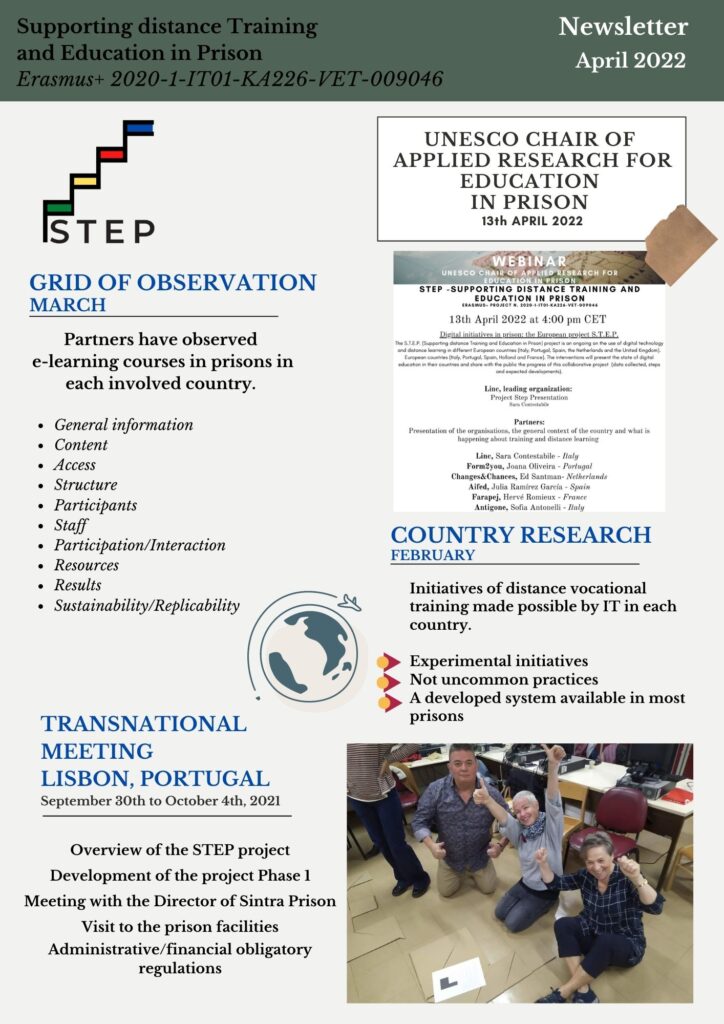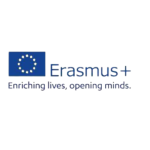
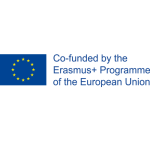
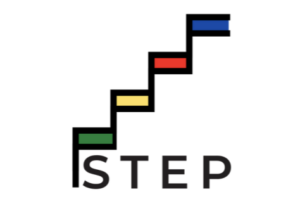
STEP – Project Supporting distance Training and Education in Prison
2020-1-IT01-KA226-VET-009046
The covid emergency that hit the world at the beginning of 2020 has imposed radical changes in our society. Most aspects of everyday life have undergone changes caused by this emergency: from the emotional to the working sphere, there has been no area that has not to deal with restrictions, changes and new organizational structures. The area of training, of course, was one of the most affected, forced to respond quickly to a situation in which part of the skills and tools have proved obsolete. Of course, having to face this crisis represented an opportunity to accelerate modernization processes, but it is undeniable that this situation has also exacerbated social inequalities and the difficulties of particular contexts of society: among these, certainly the prison context is the one that has suffered the greatest backlash.
In the penitentiary system, access to training is of enormous importance both for the quality of life during their stay in institutions and for the possibilities that people can access once their sentence is over.
GHK, a high percentage of prisoners in the EU have a rather low level of preparation and training and these low qualification levels have important negative effects on the job prospects of prisoners close to release, a condition identified as one of the key factors for relapse.
Access to adequate and quality training was a central challenge for the penitentiary system in the pre-Covid era, with the explosion of the health emergency and its repercussions these issues have become of vital importance. In fact, issues have emerged that can no longer be postponed: access to the internet and digital education, the preparation of prison staff, the basic digital skills of trainers and learners, are aspects on which to focus our efforts, being essential tools to guarantee the right to training and therefore to an effective rehabilitation process.
The STEP – Supporting distance Training and Education in Prison – project aims to support and enhance the use of digital tools and distance learning in prisons. To succeed in this aim, we believe it is necessary to support educators and prison staff in the acquisition of adequate skills for the implementation of these tools.
A fundamental first step to succeed is to adopt a common methodology through the collection of European good practices in distance learning in prison and comparing the response that different contexts have given and are giving to training needs. With the STEP project we will therefore build a comparative research between at least 4 European countries, proposing short vocational paths hops in each penitentiary institution and monitoring the organizational and management methods of these paths in vivo. This research will lay the foundations for an analysis of the Strengths and Weaknesses of each intervention with the aim of building
Our partners

l.i.n.c
Cooperative aiding youth reintegration with community planning, management, and network building.

Form2U
Non-profit empowering disadvantaged communitiesthrough social activities, personal skills, and inclusion.
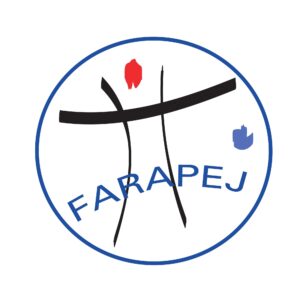
Fédération Des Associations Réflexion-Action, Prison Et Justice (Paris, France)
The aim of FARAPEJ is, "on the basis of the Declaration of Human Rights, to contribute
to the improvement of the operation of the justice system and the police and to act to
limit the destructive effects of prison". To this end, FARAPAPEJ brings together
individuals and federated associations that work for justice and wish to develop a
reflection in the service of action.
FARAPEJ was founded on 6 April 1991, under the sponsorship of 51 personalities from
the world of Penitentiary Justice. It brings together seventy associations spread
throughout France.
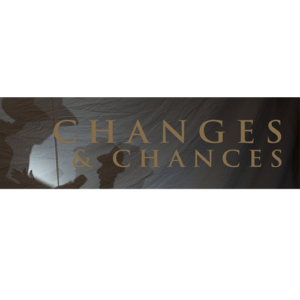
Changes&Chances (Noord-Brabant, Netherlands)
C&C is a network of institutions and freelancers which realises professional and artistic
educational programmes for the underprivileged and people who have been or are in
danger of coming into contact with justice and criminal law.
C&C looks after the interests of all those in the Netherlands who are professionally
involved in prevention, detention and rehabilitation. We are a point of contact for
authorities, politics, education, business and organisations dealing with prevention,
detention and rehabilitation.
C&C aims to contribute to a structural and integrated policy and budget for arts
education in rehabilitation programmes in all institutions dealing with justice,
prevention of criminal behaviour and recidivism. C&C aims at the highest possible
level of schooling, skills development and opportunity creation.
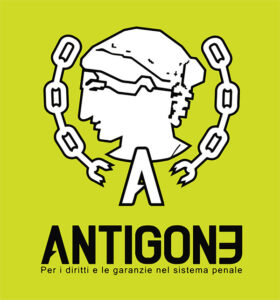
ANTIGONE (Rome, Italy)
Antigone, an association "for rights and guarantees in the penal system", was born at
the end of the 1980s.
It is a political-cultural association that mainly involves magistrates, prison workers,
academics, parliamentarians, teachers and citizens who are in some way interested in
criminal justice.
In particular, Antigone promotes debates on the model of criminal and procedural
legality in our country and its evolution; it collects and disseminates information about
the prison situation, as well as the constant reading of the relationship between the
law and its implementation.
Antigone deals with the preparation of legislative proposals and the definition of
amendments to proposals in the process of approval; it promotes information and
awareness campaigns on particular topics, always related to the legal aspect of our
country, also through the quarterly magazine Antigone.
Newsletter April 22
